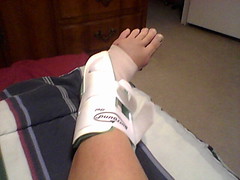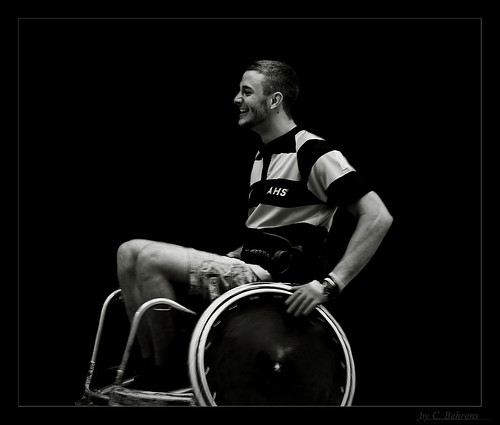 Most don’t know that child caregivers exist! A 2005 report by the National Alliance for Caregiving (PDF), “estimated that there were at least 1.3 million between the ages of 8 and 18 –(caregivers) most caring for a parent or grandparent, some looking after a sibling.”
Most don’t know that child caregivers exist! A 2005 report by the National Alliance for Caregiving (PDF), “estimated that there were at least 1.3 million between the ages of 8 and 18 –(caregivers) most caring for a parent or grandparent, some looking after a sibling.”According to the Report:
A child caregiver was defined as anyone aged 8-18 who provides unpaid help or care to any person who has an ongoing health problem or chronic-illness, or is elderly, frail, disabled, or mentally ill. In addition, to qualify as caregiver, a parent had to report that the child helps the care receiver with one or more of the following tasks:
“Nearly all caregivers help with at least one instrumental activity of daily living.” “The ADL performed by the largest proportion of child caregivers is helping the receiver get in and out of beds and chairs.”
- Household Chores or Meal Preparation
- Dressing or Feeding
- Taking Medicine or Talking to Doctors or Nurses
- Keeping Him/Her Company/Providing Emotional Support
- Shopping
- Paperwork, Bills or Arranging Outside Services
- Moving around the house, or Getting around the Community
- Bathing or Using the Bathroom
My four kids are learning about the caregiving role (and not only because they help encourage their Father, Chato Stewart,who is living with Bipolar Disorder.) I am learning about the care receiver role. I severely sprained my left ankle since my last post.
This is not a woe is me…Cannot complain, I’ve been very healthy my whole life and pretty much injury-free. This is my very first sprain that I can recall. It’s mostly an inconvenience. It interrupts my organization.
 Have you sprained anything lately?! Elevating my foot as I write, hoping the swelling will go down. This sprain and swelling can serve as a *meta “phor” something…(hopefully, it will come to me by the end of this post-lol:)
Have you sprained anything lately?! Elevating my foot as I write, hoping the swelling will go down. This sprain and swelling can serve as a *meta “phor” something…(hopefully, it will come to me by the end of this post-lol:)I’m learning “new” skills like how to hobble around on crutches and the value of stuffing my pockets to transport things. As a person who lives an extremely active life-style, who’s use to doing things for myself or for somebody else, sitting still and getting off my feet for long, doesn’t come easy! I’m forced to let others do things for me or in smarter terms: delegate, delegate! (Uh-oh! the kids have been saying I’m getting bossy and ordering them around!)
Yes, delegation involves giving up some control over a project/work! A role reversal for me, the caregiver and parent. Somethings, I prefer doing myself. Do you prefer doing things yourself? or do you delegate?
As Care-giver and Partner or Other: How can you free up time for more important things by delegating less important things? Can you relinquish some control? Control can be hard to give up, eh?
Can You train or teach your kid/s to do some of your tasks? Training and delegating to young ones and/or teens can teach them valuable life skills. For example, our kids know how to cook/bake (with supervision), do laundry, hang up clothes, iron (with supervision), sew, knit, sweep and mop, fix things, take care of and clean-up after their pets, etc. When parents allow their children to work along with them and help them, young ones progress in various tasks and learn a good work ethic.
As parents, we strive to instill a love of learning in our children. If an individual learns to enjoy working when they are young, it will serve them well as they get older. Fact of life: Life is Work!
Personally, I like to work, work, work. (No, I don’t whistle while I work, but One must follow Doc’s orders if one wants to heal, right?!:) You cannot keep me down (off my feet for long)…6 or 5 days?! No way! Did my Doc have 4 kids?! (THANKS to my Doctor and staff!:) I view work and the ability to do it (are you ready for this?!) a blessing! Yeah, I do. It’s a privilege to breathe, be alive, be (relatively) healthy and work–especially when You love your work. Even the work we don’t love so much, teaches us qualities or positive trait/s of value i.e. perseverance.
Can You imagine what life must be like for those who are chair-bound or bed-ridden who are at the mercy of others?! This injury gives me a little, tiny temporary “glimpse” into their world. THANK YOU (to ALL In that Situation) for Your Example of Courage and depth of Patience and Humility involved in waiting on others to help! Plus, You have a particular set of skills the rest of us could learn.
I have to admit, after 21 years of marriage, it’s kinda cool having hubby carry me over a threshold again like a young bride! (Don’t tell him I said that!:) Very Thankful Hubby and Kids have been taking good care of me!:) Though, I cannot wait to be freely mobile…I don’t idle long! Yes, you’re right! This is an “opportunity” to catch-up on my studies, research, writing.
While waiting in the ER, my 9 year old noticed a man with 1 arm. She asked about my foot: “Mom, will they have to amputate?” Hope NOT Honey! We wondered how he lost his arm? We wondered what new skills he has learned?
I’ve learned to appreciate my feet and how much I need both.
THANK YOU (to All in that Situation who have lost a limb) for your example of Strength to Carry-on. You have learned a particular set of important life skills.
Actually, this arm/foot talk reminds me of these Biblical verses:
“For the body, indeed, is not one member, but many. If the foot should say: ‘Because I am not a hand, I am no part of the body,’ it is not for this reason no part of the body. And if the ear should say: ‘Because I am not an eye, I am no part of the body,’ it is not for this reason no part of the body. If the whole body were an eye, where would the sense of hearing be? If it were all hearing, where would the smelling be?….The eye cannot say to the hand: ‘I have no need of you’; or, again, the head cannot say to the feet: ‘I have no need of you.’ But much rather is it the case that the members of the body which seem to be weaker are necessary.” 1Corinthians 12:14-18, 21,22.These verses stress interdependency…and how ridiculous it would be to compare our eyes with our hands or our feet with our ears! Each member of the body serves a different function, yet all the members are useful and valuable to the whole body. This also highlights how ridiculous it is to compare one body (one person) to another body/person!
-
“When we try to pick out anything by itself, we find it hitched to everything else in the Universe.” ~ John Muir’s book: My First Summer in the Sierra (Boston: Houghton Mifflin, 1911), on page 110 of the Sierra Club Books 1988 edition. It is found in Chapter 6.
Independent thinking alone is not suited to interdependent reality. Independent people who do not have the maturity to think and act interdependently may be good individual producers, but they won’t be good leaders or team players. They’re not coming from the paradigm of interdependence necessary to succeed in marriage, family, or organizational reality. ~ Stephen Covey, The Seven Habits of Highly Effective People, 1989
Here’s highlights:
Child caregivers in the United States have largely been ignored, says Carol Levine, director of families and health care at the United Hospital Fund. “People don’t want to think of children providing care,” Levine said. “For whatever reason, it suits people not to see it.”Levine has seen these kids grow up to be mature, responsible adults who are closely connected to their families. They show evidence of having high self-esteem, more empathy and a strong sense of belonging. Many she knows have gone into the health-care industry or social work so they can continue to care for others. But she says her organization doesn’t see the child caregivers who get lost, the ones who wind up in jail or on the streets because they had too much to deal with at home.
How can we help child caregivers preserve their childhood? Do you personally know any child caregivers? Please share your suggestions of support! i.e. How can we protect a child caregiver’s childhood?
THANK YOU to All Child Caregivers! You shoulder responsibilities some adults cannot. You are Loved! You are Valued! 
“A 2012 study published in the Journal of Behavioral Health Services & Research analyzed data from 1,200 students in two Florida school districts. Researchers found that child caregivers were at a significantly higher risk for anxiety and depression.”
Every Child Deserves a Childhood!



No comments:
Post a Comment